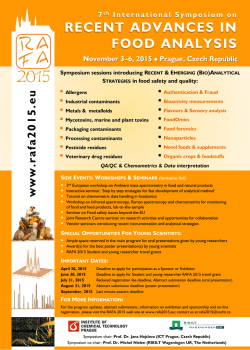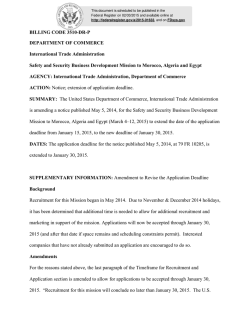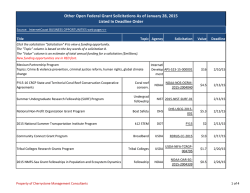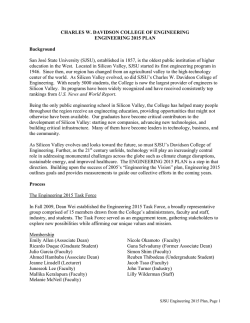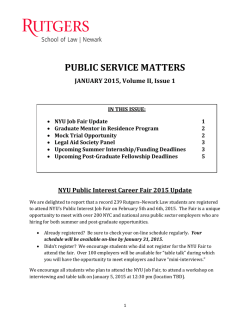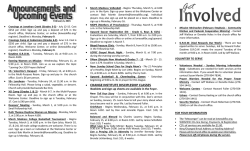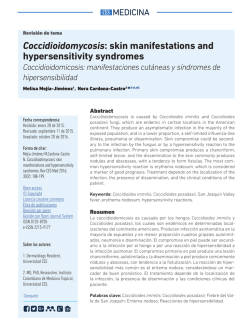
Bulletin February 2015
SJSU Research Foundation Office of Sponsored Programs Bulletin February 2015 A monthly publication featuring sponsored program information, trends, and opportunities. To view the Bulletin online, visit the SJSU Research Foundation website at www.sjsufoundation.org February 19 – SJSU Research Foundation Workshop: Budget Basics—Developing Budgets for a Successful Proposal Location: MLK Library, Room 255/257 | Time: 11:30 a.m. to 1:00 p.m. | RSVP by February 13 An important part of writing a successful grant proposal is developing a budget that clearly expresses the cost of your research project. Where do you begin when creating your budget? For example, do you plan to hire students, purchase supplies, rent space, or attend conferences? How will these costs affect your proposed budget? This workshop will be a step-by-step primer on the components of a proposal budget and how best to build a budget in response to a request for proposal (RFP). Each of the major line items in a typical budget will be discussed in detail. Important topics such as salaries, cost-sharing, facilities and administrative costs, and allowable costs will be addressed. RSVP to Carmina Som at [email protected]. The Time is Now! Update or Register Your Funding Alert System Profile As we begin the spring semester, this might be a great time to update or register your profile in the Funding Alert System. The SJSU Research Foundation Funding Alert System uses a database that matches faculty interests with external funding opportunities collected from various sponsoring agencies, and then sends email notifications to faculty subscribers based on the keywords they provide. A keyword represents a faculty member’s topic of research or development. Faculty who wish to register as new subscriber and begin receiving funding alerts or those who want to update their current profiles may do by completing and emailing the Funding Alert System Keyword Selection and Subscription Form to [email protected]. March 5 – Targeted Training: How to Manage Your Externally-Funded Project Now that a sponsor has funded your project you are ready to get started! To assist you with managing your project, the SJSU Research Foundation will host an informative training session that will cover the essential elements of externally-funded project administration from beginning to end. Meet the knowledgeable SJSU Research Foundation administrators who will support you throughout the lifecycle of your project including Post-Award analysts, and members from Finance and Accounting and Human Resources. Topics will include budgeting, staff hiring, payroll processing, compliance, travel, and purchasing. Who should attend? This session is especially designed for principal investigators, project staff, and SJSU college and department analysts. Please respond to [email protected] and reference the training session title in the subject line. IN THIS ISSUE • February 19—SJSURF Workshop: Buget Basics • Update or Register Your Funding Alert System Profile • March 5—SJSURF Targeted Training: How to Manage Your Externally-Funded Project • Important Announcements from NIH, NSF, and Grants.gov • DHS S&T Launches National Conversation on Homeland Security • New Approaches for Broadening Participation at NIH • Top Ten Helpful Hints for Writing Proposals • Fellowships and Scholarships Important Announcements from NIH, NSF, and Grants.gov In the Federal Demonstration Partnership meeting on January 12-13, 2015 in Washington D.C. the National Institutes of Health (NIH) announced that it will begin requiring all PIs to use its new biosketch format on May 25, 2015 (as reported in the January 2015 OSP Bulletin). In the same meeting an NSF representative shared that on January 26, 2015, NSF will institute automated compliance checking of all proposals to ensure that submissions contain mandatory form, signatures, and information, Also, Grants.gov announced in the meeting that, starting mid-February 2015, grantees will be able to submit proposals that use special characters, including mathematical notations and accents, such as π and ü. For further information on the meeting, contact Program Advisor Irelene Ricks at [email protected]. Material from 1/26/2015 GrantWeek, with permission from the Grants Resource Center. DHS S&T Launches National Conversation on Homeland Security Technology On January 12, 2015 the Department of Homeland Security (DHS) Science and Technology Directorate (S&T) launched a public engagement strategy, titled the National Conversation on Homeland Security Technology, to connect partners and the public on research and development supporting the missions of homeland security. The National Conversation on Homeland Security Technology is a series of online and in-person discussions aimed at creating a dialogue between the public as well the nation’s first responders, industry representatives, academia, and government officials to shape the future of homeland security technology. According to DHS Under Secretary for Science and Technology Dr. Reginald Brothers the forum is provided “for everyone to come together to discuss issues such as equipping the responder of the future, enabling homeland security decision makers, establishing a trusted cyber future, screening at speed, and creating resilient communities.” For more information and to join the conversation, go to http://scitech.dhs.gov. Source: Department of Homeland Security website. New Approaches to Broadening Participation at NIH In mid-November 2014 the National Institutes of Health (NIH) hosted the “National Strategy for Expanding Scientific Workforce Diversity: Developing an Action Plan” webinar and introduced a new plan to diversify and increase participation of underserved and underrepresented minority (URM) students, undergraduate institutions, and Minority Serving Institutions (MSIs) in the biomedical workforce. Chief Officer for Scientific Workforce Development Hannah Valantine led the discussion. She was joined on the panel by NIH Principal Deputy Director Lawrence Tabar, and NIH Director Francis Collins. They described the key objectives of what NIH calls the “Straw Model”—a comprehensive plan to diversify careers at all levels of the biomedical workforce. A major element of the plan encourages undergraduate institutions to partner with research extensive universities. Some of the key objectives include: data collection and evaluation; mentoring and career preparation and retention; institutional support; research interventions and testing; outreach; and addressing issues associated with belonging and inclusion in the biomedical fields. Over a hundred faculty researchers, policymakers, and faculty administrators who work with underserved and URM students and MSIs participated in the webinar. NIH invites comments from the science community regarding the Straw Model. Requests for copies of the webinar may be sent directly to [email protected]. Material from 12/1/2014 GrantWeek, with permission from the Grants Resource Center. Top Ten Helpful Hints for Writing Proposals 1. Start early. 2. Notify your SJSU Research Foundation sponsored programs manager as soon as you think you will be submitting a proposal. 3. Follow the sponsor guidelines. 4. Use the headings and wording the sponsor uses. 5. Notify your chair and dean as soon as you know you’ll be submitting a proposal. Your proposal will be routed to you and to campus signers (e.g., chair, dean, SJSURF sponsored programs manager, SJSURF director of the Office of Sponsored Programs, SJSU associate vice president of Research, and an SJSU fiscal officer). 6. Leave yourself time for a peer review. 2 7. Submit an Institutional Review Board application or request for exemption to SJSU if your proposal includes data collection from humans (e.g., interviews, surveys, questionnaires, evaluation forms). 8. Include your plan for obtaining department, campus, and CSU curriculum approval if you are proposing new courses or major curriculum changes. 9. Be prepared to write a justification of your budget costs for the sponsor. 10.Commit to providing cost share or matching funds only if the proposal guidelines indicate that cost share is required. Fellowships and Scholarships The SJSU Research Foundation receives notification of fellowship and scholarship opportunities for faculty and students. Highlights this month include: Program: Agency: Deadline: Summer Undergraduate Research Fellowships (SURF) U.S. Department of Commerce February 13, 2015 Program: Agency: Deadline: Jacob Rader Marcus Center Fellowship Program American Jewish Archives February 23, 2015 Program: Agency: Deadline: Visiting Research Fellowships in Humanities University of Edinburgh February 28, 2015 Program: Agency: Deadline: Research Fellowships in Early American Economy and Society Library Company of Philadelphia March 1, 2015 Program: Agency: Deadline: Research Fellowships Folger Shakespeare Library March 1, 2015 Program: Agency: Deadline: James Madison Fellowships James Madison Memorial Fellowship Foundation March 1, 2015 Program: Agency: Deadline: SAMHSA Minority Fellowships Program American Nurses Association March 1, 2015 Program: Agency: Deadline: Library Resident Research Fellowships American Philosophical Society March 2, 2015 Program: Agency: Deadline: Public Scholar Program National Endowment for the Humanities March 3, 2015 Program: Agency: Deadline: 2015 Donald A. King HDSA Summer Research Fellowship Huntington’s Disease Society of America March 6, 2015 Program: Agency: Deadline: Fellowship Awards in the Neurosciences Klingenstein (Esther A. & Joseph) Fund, Inc. March 10, 2015 3
© Copyright 2026
